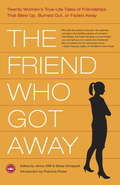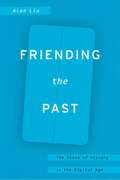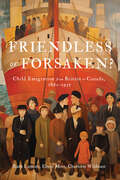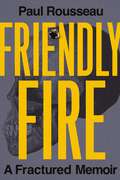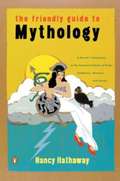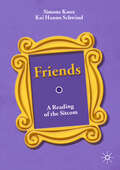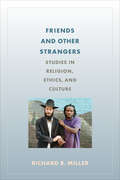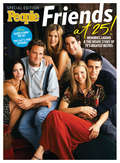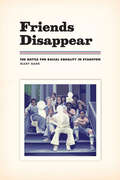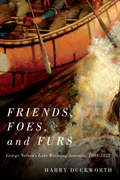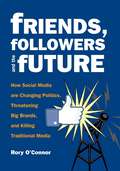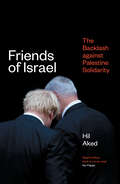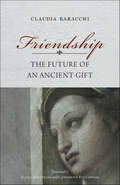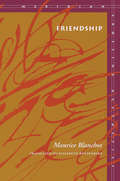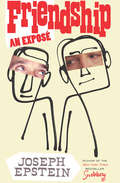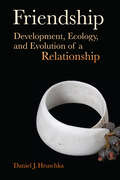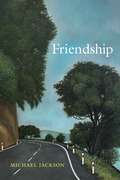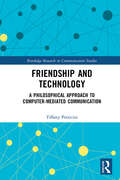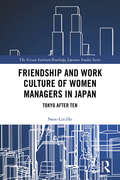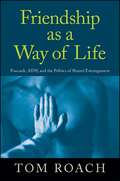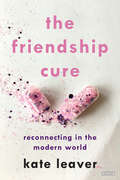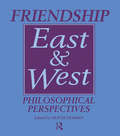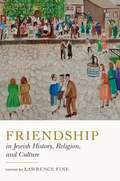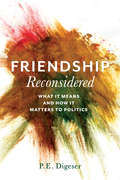- Table View
- List View
The Friend Who Got Away: Twenty Women's True Life Tales of Friendships that Blew Up, Burned Out or Faded Away
by Jenny Offill Elissa SchappellLosing a friend can be as painful and as agonizing as a divorce or the end of a love affair, yet it is rarely written about or even discussed. THE FRIEND WHO GOT AWAY is the first book to address this near-universal experience, bringing together the brave, eloquent voices of writers like Francine Prose, Katie Roiphe, Dorothy Allison, Elizabeth Strout, Ann Hood, Diana Abu Jabar, Vivian Gornick, Helen Schulman, and many others. Some write of friends who have drifted away, others of sudden breakups that took them by surprise. Some even celebrate their liberation from unhealthy or destructive relationships. Yet at the heart of each story is the recognition of a loss that will never be forgotten. From stories about friendships that dissolved when one person revealed a hidden self or moved into a different world, to tales of relationships sabotaged by competition, personal ambition, or careless indifference, THE FRIEND WHO GOT AWAY casts new light on the meaning and nature of women’s friendships. Katie Roiphe writes with regret about the period in her life when even close friends seemed expendable compared to men and sex. Mary Morris reveals how a loan led to the unraveling of a lifelong friendship. Vivian Gornick explores how intellectual differences eroded the bond between once inseparable companions. And two contributors, once best friends, tell both sides of the story that led to their painful breakup. Written especially for this anthology and touched with humor, sadness, and sometimes anger, these extraordinary pieces simultaneously evoke the uniqueness of each situation and illuminate the universal emotions evoked by the loss of a friend.
Friending the Past: The Sense of History in the Digital Age
by Alan LiuCan today’s society, increasingly captivated by a constant flow of information, share a sense of history? How did our media-making forebears balance the tension between the present and the absent, the individual and the collective, the static and the dynamic—and how do our current digital networks disrupt these same balances? Can our social media, with its fleeting nature, even be considered social at all? In Friending the Past, Alan Liu proposes fresh answers to these innovative questions of connection. He explores how we can learn from the relationship between past societies whose media forms fostered a communal and self-aware sense of history—such as prehistorical oral societies with robust storytelling cultures, or the great print works of nineteenth-century historicism—and our own instantaneous present. He concludes with a surprising look at how the sense of history exemplified in today’s JavaScript timelines compares to the temporality found in Romantic poetry. Interlaced among these inquiries, Liu shows how extensive “network archaeologies” can be constructed as novel ways of thinking about our affiliations with time and with each other. These conceptual architectures of period and age are also always media structures, scaffolded with the outlines of what we mean by history. Thinking about our own time, Liu wonders if the digital, networked future can sustain a similar sense of history.
Friendless or Forsaken?: Child Emigration from Britain to Canada, 1860–1935 (States, People, and the History of Social Change #8)
by Charlotte Wildman Eloise Moss Ruth LamontBetween 1860 and 1935, about 100,000 impoverished children were emigrated from Britain to Canada to seek a new life in the “land of plenty.” Charities, religious workers, philanthropists, and state-run institutions such as workhouses and orphanages all sent children abroad, claiming that this was the only way to prevent their becoming criminals or joining the masses of working-class unemployed.Friendless or Forsaken? follows the story of child emigration agencies operating in North West England, tracing the imperial relationships that enabled agents to send children away from their homes and parents, who often lost sight of them forever. The book sheds light on public support for the schemes, their financial beneficiaries, and how parents were persuaded to consent to sending their children across the world – frequently without fully realizing what rights they had signed away. The story charts the legal measures introduced to maintain and regulate child emigration schemes, as well as the way “home children” were portrayed as both needy and dangerous on each side of the Atlantic and how the children themselves sought to overcome prejudice and isolation in an unfamiliar country.Exploring the transnational economy of child emigrations schemes, Friendless or Forsaken? records the bravery and resilience of those children whose lives were altered by this traumatic and divisive episode in the history of empire.
Friendly Fire: A Fractured Memoir
by Paul Rousseau&“A powerful, gut-wrenching tale of pain, suffering, and recovery.&” —KIRKUS REVIEWS&“Unique and haunting…. A mesmerizing and unforgettable meditation on a stranger-than-fiction tragedy.&” —PUBLISHERS WEEKLY STARRED REVIEWOne month before his college graduation, Paul Rousseau is accidentally shot in the head by his roommate and best friend.At some point in the course of Paul and Mark&’s friendship, Mark acquired—legally and with required permits—five firearms. Those weapons lived with them in their college apartment. It was a non-issue for the two best friends. They were inseparable. They were twenty-two-year-old boys at the height of their college experience, unaware that everything was about to change forever.The bullet ripped through two walls before it struck Paul&’s skull. Mark had accidentally pulled the trigger while in the other room and—frightened for his own future—delayed getting treatment for Paul, who miraculously remained conscious the entire time. In vivid detail, Friendly Fire brings us into the world of both the shooting itself and its surgical counterpoint—the dark spaces of survival in the face of a traumatic brain injury and into the paranoid, isolating, dehumanizing maw of personal injury cases.Friendly Fire is the story of a friendship—both its formation and its destruction. Through phenomenal writing and gripping detail, Paul reveals a compelling and inspirational story that speaks to much of contemporary American life.
The Friendly Guide to Mythology
by Nancy HathawayHow was the world as we know it created? What does it mean to be a hero? Where do we go when we die? Why are flood myths so ubiquitous? Anyone who has pondered these and other questions about humanity's ancient beliefs will be fascinated by The Friendly Guide to Mythology. Focusing on Greek and Roman mythology but including myths from Africa, Asia, Australia, northern Europe, and the Americas, The Friendly Guide to Mythology is filled with compelling stories of gods, goddesses, mortals, and monsters. Beautifully ornamented with photos, line drawings, and quotes, this entertaining guide also includes an A-to-Z listing of the world's most captivating goddesses; profiles of famous writers, collectors, and interpreters of myths; and engaging sidebars. Featuring myths of love, wisdom, and adventure as well as those of violence, jealousy, and pure folly, this accessible collection offers fascinating insight into the human psyche and brings our rich mythological heritage delightfully into focus. .
Friends: A Reading of the Sitcom
by Simone Knox Kai Hanno SchwindThis book offers a long overdue, extensive study of one of the most beloved television shows: Friends. Why has this sitcom become the seminal success that it is? And how does it continue to engage viewers around the world a quarter century after its first broadcast? Featuring original interviews with key creative personnel (including co-creator Marta Kauffman and executive producer Kevin S. Bright), the book provides answers by identifying a strategy of intimacy that informs Friends’ use of humour, performance, style and set design. The authors provide fascinating analyses of some of the most well-remembered scenes—the one where Ross can’t get his leather pants back on, and Ross and Rachel’s break-up, to name just a couple—and reflect on how and why A-list guest performances sometimes fell short of the standards set by the ensemble cast. Also considered are the iconic look of Monica’s apartment as well as the programme’s much discussed politics of representation and the critical backlash it has received in recent years. An exploration of Joey, the infamous spin-off, and several attempts to adapt Friends’ successful formula across the globe, round out the discussion, with insights into mistranslated jokes and much more. For students, scholars, creative industry practitioners and fans alike, this is a compelling read that lets us glimpse behind the scenes of what has become a cultural phenomenon and semi-permanent fixture in many of our homes.
Friends and Other Strangers: Studies in Religion, Ethics, and Culture
by Richard MillerFriends and Other Strangers argues for expanding the field of religious ethics to address the normative dimensions of culture, interpersonal desires, friendships and family, and institutional and political relationships. Richard B. Miller urges religious ethicists to turn to cultural studies to broaden the range of the issues they address and to examine matters of cultural practice and cultural difference in critical and self-reflexive ways. Friends and Other Strangers critically discusses the ethics of ethnography; ethnocentrism, relativism, and moral criticism; empathy and the ethics of self-other attunement; indignation, empathy, and solidarity; the meaning of moral responsibility in relation to children and friends; civic virtue, war, and alterity; the normative and psychological dimensions of memory; and religion and democratic public life. Miller challenges distinctions between psyche and culture, self and other, and uses the concepts of intimacy and alterity as dialectical touchstones for examining the normative dimensions of self-other relationships. A wholly contemporary, global, and interdisciplinary work, Friends and Other Strangers illuminates aspects of moral life ethicists have otherwise overlooked.
Friends at 25! (PEOPLE)
by The Editors of PEOPLEGrab a cup of coffee from Central Perk and catch up with your favorite friends from New York City! 25 years after the show's premiere, Friends remains one of the most watched (and streamed) series ever created. To celebrate, this special anniversary edition takes you back to one of the most beloved sitcoms of the '90s. Reconnect with Rachel, Monica, Ross, Chandler, Phoebe, and Joey from their naïve early days and dating mishaps to their increasingly complicated adulting in some of the most memorable and talked about episodes of modern television. Revisit those iconic locations and that catchy theme song, consider the 10 funniest moments from the show's 10 seasons, recall the best guest stars (Brad Pitt, Julia Roberts, Jeff Goldblum, and more), and take the quiz to see if you're a true friend! Follow this special edition to meet your friends and celebrate your 25-year reunion.
Friends Disappear: The Battle for Racial Equality in Evanston
by Mary BarrA sociologist returns to her suburban Illinois hometown to compare the paths of black and white childhood friends in a “fascinating” mix of study and memoir (Chicago Tribune).Mary Barr thinks a lot about the old photograph on her refrigerator door. In it, she and a dozen or so friends from the Chicago suburb of Evanston sit on a porch. It’s 1974, the summer after they graduated from Nichols Middle School, and what strikes her immediately—aside from the Soul Train–era clothes—is the diversity of the group: boys and girls, black and white, in the variety of poses you’d expect from a bunch of friends on the verge of high school. But the photo also speaks to the history of Evanston, to integration, and to the ways that those in the picture experienced and remembered growing up in a place that many at that time considered to be a racial utopia.In Friends Disappear, Barr goes back to her old neighborhood and pieces together a history of Evanston with a particular emphasis on its neighborhoods, its schools, and its work life. She finds that there is a detrimental myth of integration surrounding Evanston despite bountiful evidence of actual segregation, both in the archives and from the life stories of her subjects. Curiously, the city’s own desegregation plan is partly to blame. The initiative called for the redistribution of students from an all-black elementary school to institutions situated in white neighborhoods. That, however, required busing, and between the tensions it generated and obvious markers of class difference, the racial divide, far from being closed, was widened. Friends Disappear highlights how racial divides limited the life chances of blacks while providing opportunities for whites, and offers an insider’s perspective on the social practices that doled out benefits and penalties based on race—despite attempts to integrate.“Barr’s gripping exploration of the divergent paths friends took away from a childhood snapshot combines the rigor of scholarship with the personal touch of memoir. I have rarely read a book that so effectively illustrates the persistence of racial disparities in the United States with unforgettable, wrenching life stories.” —Amanda Seligman, University of Wisconsin-MilwaukeeHonorable Mention, Midwest Sociological Society Distinguished Book Award
Friends, Foes, and Furs: George Nelson's Lake Winnipeg Journals, 1804–1822 (Rupert's Land Record Society Series #15)
by Harry W. DuckworthGeorge Nelson (1786-1859) was a clerk for the North West Company whose unusually detailed and personal writings provide a compelling portrait of the people engaged in the golden age of the Canadian fur trade. Friends, Foes, and Furs is a critical edition of Nelson's daily journals, supplemented with exciting anecdotes from his "Reminiscences," which were written after his retirement to Lower Canada. An introduction and annotations by Harry Duckworth place Nelson's material securely within the established body of fur trade history. This series of journals gives readers a first-person account of Nelson's life and career, from his arrival at the age of eighteen in Lake Winnipeg, where he was stationed as an apprentice clerk from 1804 to 1813, to his second service from 1818 to 1819 and an 1822 canoe journey through the region. A keen and respectful observer, Nelson recorded in his daily journals not only the minutiae of his work, but also details about the lives of voyageurs, the Ojibwe and Swampy Cree communities, and others involved in the fur trade. His insights uncover an extraordinary view of the Lake Winnipeg region in the period just prior to European settlement. Making the full extent of George Nelson's journals available for the first time, Friends, Foes, and Furs is an intriguing account of one man's adventures in the fur trade in prairie Canada.
Friends, Followers and the Future
by Rory O'Connor"Rory O'Connor is one of the smartest media guys around. He knows who's spinning, who's pandering, and who's putting money in his own pocket at the expense of logic, reason, and the public good."-Michael Wolff, Vanity Fair media criticThere's a revolution going on, as ever-accelerating developments in digital information technologies change nearly every aspect of how we live, work, play, do business, and engage in politics. Share and share alike-the numbers say it all as billions of people worldwide flock to online media and use social networks to discover and spread news and information.In the process, ever-growing networks of "ordinary people" are using these powerful new tools to trim the influence long held by Big Business, Big Government, and Big Media. No longer just passive recipients, participants in social networks now regularly make and break news while organizing civic and political actions that bypass censors, outpace traditional media, attract massive audiences, and influence the rise and fall of brands, industries, politicians, and even governments.In this insider's look at how social media are transforming our world, Rory O'Connor explains the trends and explores what tech visionaries, media makers, political advisers, and businesspeople are saying about the meteoric rise of the various social networks of friends and followers, and what they bode for our future.Rory O'Connor, co-founder of MediaChannel.org, is the author of Shock Jocks: Hate Speech & Talk Radio. He has won two Emmys and a George Orwell Award, among many other honors.
Friends of Israel: The Backlash Against Palestine Solidarity
by Hilary Frances AkedIs there such a thing as &“the Israel lobby,&” and how powerful is it really? Friends of Israel provides a forensically researched account of the activities of Israel&’s advocates in Britain, showing how they contribute to maintaining Israeli apartheid. The book traces the history and changing fortunes of key actors within the British Zionist movement in the context of the Israeli government&’s contemporary efforts to repress a rising tide of solidarity with Palestinians expressed through the Boycott Divestment and Sanctions (BDS) movement. Offering a nuanced and politically relevant account of pro-Israel actors&’ strategies, tactics, and varying levels of success in key arenas of society, it draws parallels with the similar anti-boycott campaign waged by supporters of the erstwhile apartheid regime in South Africa. By demystifying the actors involved in the Zionist movement, the book provides an anti-racist analysis of the pro-Israel lobby which robustly rebuffs anti-Semitic conspiracies. Sensitively and accessibly written, it emphasises the complicity of British actors - both those in government and in civil society. Drawing on a range of sources including interviews with leading pro-Israel activists and Palestinian rights activists, documents obtained through Freedom of Information requests and archival material, Friends of Israel is a much-needed contribution to Israel/Palestine-related scholarship and a useful resource for the Palestine solidarity movement.
Friendship: The Future of an Ancient Gift (Studies in Continental Thought)
by Claudia BaracchiIn Friendship, Italian philosopher Claudia Baracchi explores the philosophical underpinnings of friendship. Tackling the issue of friendship in the era of Facebook and online social networks requires courage and even a certain impertinence. The friendship relationship involves trust, fidelity, and availability for profound sharing. Sociologists assure us this attitude was never more improbable than in our time of dramatic anthropological reconfiguration. Research on friendship cannot therefore ignore ancient thought: with unparalleled depth, Friendship examines the broader implications of relationship, both emotional and political. Today, the grand socio-political structures of the world are trembling. The hold of valued paradigms that traditionally positioned individuals, determined their destinies, and assigned them their roles and reciprocal responsibilities is becoming uncertain. In these many global shifts, previously unforeseen possibilities for individual and collective becoming are unleashed. Perhaps friendship has to do with worlds that are not: that are not yet, and that should be desired all the more. Focusing on the works of Aristotle, Baracchi explores ancient reflections on friendship, in the belief that they have much to teach us about our relationships in the present day.
Friendship (Meridian: Crossing Aesthetics Ser. #261)
by Maurice Blanchot Elizabeth RottenbergFor the past half century, Maurice Blanchot has been an extraordinarily influential figure on the French literary and cultural scene. He is arguably the key figure after Sartre in exploring the relation between literature and philosophy. This collection of 29 critical essays and reviews on art, politics, literature, and philosophy documents the wide range of Blanchot's interests, from the enigmatic paintings in the Lascaux caves to the atomic era. Essays are devoted to works of fiction (Louis-René des Forêts, Pierre Klossowski, Roger Laporte, Marguerite Duras), to autobiographies or testimonies (Michel Leiris, Robert Antelme, André Gorz, Franz Kafka), or to authors who are more than ever contemporary (Jean Paulhan, Albert Camus). Several essays focus on questions of Judaism, as expressed in the works of Edmond Jabès, Emmanuel Levinas, and Martin Buber. Among the other topics covered are André Malraux's "imaginary museum," the Pléiade Encyclopedia project of Raymond Queneau, paperback publishing, the work of Claude Lévi-Strauss, Benjamin's "Task of the Translator," Marx and communism, writings on the Holocaust, and the difference between art and writing. The book concludes with an eloquent invocation to friendship on the occasion of the death of Georges Bataille.
Friendship: An Expose
by Joseph EpsteinThe amusing and erudite anatomy of modern friendship, from the New York Times–bestselling author of Snobbery. Is it possible to have too many friends? Is your spouse supposed to be your best friend? How far should you go to help a friend in need? And how do you end a friendship that has run its course? In a &“smart, delightfully literate, and sophisticated&” anatomy of friendship in all its contemporary guises, Joseph Epstein uncovers the rich and surprising truths about our favored companions (Los Angeles Times). Friendship illuminates those complex, wonderful relationships without which we&’d all be lost. &“Reading [Epstein] is like spending an evening being flatteringly entertained by the most interesting guy at the party.&” —The Seattle Times &“A brilliant and outspoken commentator . . . Epstein&’s graceful style and irrepressible wit provide unalloyed pleasure.&” —Chicago Tribune &“Brisk and delightful.&” —The Wall Street Journal
Friendship: Development, Ecology, And Evolution Of A Relationship (Origins Of Human Behavior And Culture Ser. #5)
by Daniel J. HruschkaFriends-they are generous and cooperative with each other in ways that appear to defy standard evolutionary expectations, frequently sacrificing for one another without concern for past behaviors or future consequences. In this fascinating multidisciplinary study, Daniel J. Hruschka synthesizes an array of cross-cultural, experimental and ethnographic data to understand the broad meaning of friendship, how it develops, how it interfaces with kinship and romantic relationships, and how it differs from place to place. Hruschka argues that friendship is a special form of reciprocal altruism based not on tit-for-tat accounting or forward-looking rationality, but rather on mutual goodwill that is built up along the way. Using mathematical models, he shows that such an approach to cooperation can resist exploitation at the hands of false friends, while addressing adaptive problems of mutual aid. Hruschka provides a novel and comprehensive treatise on the anthropology, biology, psychology, and sociology of this essential and universal human relationship.
Friendship
by Michael JacksonIn this book, renowned anthropologist Michael Jackson draws on philosophy, biography, ethnography, and literature to explore the meanings and affordances of friendship—a relationship just as significant as, yet somehow different from, kinship and love. Beginning with Aristotle’s accounts of friendship as a political virtue and Montaigne’s famous essay on friendship as a form of love, Jackson examines the tension between the political and personal resonances of friendship in the philosophy of Hannah Arendt, the biography of the Indian historian Brijen Gupta, and the oral narratives of a Kuranko storyteller, Keti Ferenke Koroma. He offers reflections on childhood friends, imaginary friends, lifelong friendships, and friendships with animals. He ruminates particularly on the complications of friendship in the context of anthropological fieldwork, exploring the contradiction between the egalitarian spirit of friendship on the one hand and, on the other, the power imbalance between ethnographers and their interlocutors.Through these stories, Jackson explores the unpredictable interplay of mutability and mutuality in intimate human relationships, and the critical importance of choice in forming friendship—what it means to be loyal to friends through good times and bad, and even in the face of danger. Through a blend of memoir, theory, ethnography, and fiction, Jackson shows us how the elective affinities of friendship transcend culture, gender, and age, and offer us perennial means of taking stock of our lives and getting a measure of our own self-worth.
Friendship and Technology: A Philosophical Approach to Computer Mediated Communication (Routledge Research in Communication Studies)
by Tiffany A. PetriciniThis book explores the nature of technology – participatory media in particular – and its effects on our friendships and our fundamental sense of togetherness. Situating the notion of friendship in the modern era, the author examines the possibilities and challenges of technology on our friendships. Taking a media ecology approach to interpersonal communication, she looks at issues around phenomenology, recognition of friends as unique, hermeneutics in a digital world and mediated communication, social dimensions of time and space, and communication ethics. Examining friendship as a communicative phenomenon and exploring the ways in which it is created, sustained, managed, produced, and reproduced, this book will be relevant to scholars and students of interpersonal communication, mediated communication, communication theory and philosophy, and media ecology. This book is freely available as a downloadable Open Access PDF under a Creative Commons Attribution-Non Commercial-No Derivatives 4.0 license.https://www.taylorfrancis.com/books/mono/10.4324/9781003188810/friendship-technology-tiffany-petricini
Friendship and Work Culture of Women Managers in Japan: Tokyo After Ten (Nissan Institute/Routledge Japanese Studies)
by Swee-Lin HoDrawing on ethnographic data gathered from fieldwork spanning a 15-year period, this book offers new insights into understanding the lives and experiences of women managers in Japan. Based on empirical case studies, it explores the ways in which professional women in Tokyo creatively mobilize their friendships as a strategic site for mitigating the disappointments in their working lives, and conceptualizing new understandings of independence and equality. It analyses their use of language, time, space and money to negotiate new identities in an increasingly flexible work environment. In examining the challenges and opportunities faced by these corporate workers, this book also extends anthropological debates about the changing meaning and importance of work for women, as well as their relationship with money and separation from the realm of domesticity. As a study of women's lives in and out of the workplace in Japan, this book will be of great interest to students and scholars of Japanese studies, Japanese culture and society, anthropology, sociology, gender and women's studies.
Friendship as a Way of Life: Foucault, AIDS, and the Politics of Shared Estrangement
by Tom RoachBorrowing its title from a 1981 interview of Michel Foucault, Friendship as a Way of Life develops the philosopher's late work on friendship into a novel critique of contemporary GLBT political strategy. Tom Roach brings to life Foucault's scant but suggestive writings on friendship (some translated here for the first time), emphasizing their ethical implications and advancing a new and politically viable concept—friendship as shared estrangement. In exploring the potential of this model for understanding not only social movements such as ACT UP and the AIDS buddy system, but the literary and artistic work of Hervé Guibert and David Wojnarowicz as well, Roach seeks to reclaim a politics of friendship for queer activism. The first book devoted exclusively to Foucault's work on the subject, it reassesses Foucaultian queer theory in light of the recent publication of the philosopher's final seminars at the Collège de France. Its provocative thesis returns Foucault's concept of biopower to its home in sexuality studies and places queer theory front and center in current biopolitical debates.
The Friendship Cure: A Manifesto For Reconnecting In The Modern World
by Kate LeaverThe compelling, fresh, and thought-provoking exploration of friendship—what it is, how to keep it, and why we need it more than ever before Our best friends, Twitter followers, gal-pals, bromances, Facebook friends, and long distance buddies define us in ways we rarely openly acknowledge. But as a society, we are simultaneously terrified of being alone and already desperately lonely. We move through life in packs and friendship circles and yet, in the most interconnected age, we are stuck in the greatest loneliness epidemic of our time. It's killing us, making us miserable and causing a public health crisis. Increasingly, we don’t just die alone; we die because we are alone. What if meaningful friendships are the solution? Journalist Kate Leaver believes that friendship is the essential cure for the modern malaise of solitude, ill health, and anxiety and that, if we only treated camaraderie as a social priority, it could affect everything from our physical health and emotional well being. Her much-anticipated manifesto, The Friendship Cure, looks at what friendship means, how it can survive, why we need it, and what we can do to get the most from it. Why do some friendships last a lifetime, while others are only temporary? How do you “break up” with a toxic friend? How do you make friends as an adult? Can men and women really be platonic? What are the curative qualities of friendship, and how we can deploy friendship to actually live longer, better lives? From behavioral scientists to besties, Kate draws upon the extraordinary research from academics, scientists, and psychotherapists, and stories from friends of friends, strangers from the Internet, and her “squad” to get to the bottom of these and other facets of friendship. For readers of Susan Cain’s Quiet and Elizabeth Gilbert’s Big Magic, The Friendship Cure is a fascinating blend of accessible “smart thinking,” investigative journalism, pop culture, and memoir for anyone trying to navigate this lonely world, written with the wit, charm, and bite of a fresh voice.
Friendship East and West: Philosophical Perspectives (Curzon Studies In Asian Philosophy Ser. #No.2)
by Oliver LeamanThere has been renewed interest in the concept of friendship in contemporary philosophy. Many of the existing treatments of the topic have been limited to Western notions of friendship, yet there is a far wider perspective available to us through an examination of a more extended cultural examination of the topic. Cultures other than those in Christian Europe have had important and interesting observations to make on the nature of friendship, and in this collection there is treatment not only of Greek and Christian ideas of friendship, but also of Islamic, Jewish, Chinese, Japanese and Indian perspectives. A rich and extended view of the concept of friendship results from these various examinations.
Friendship in Jewish History, Religion, and Culture (Dimyonot: Jews and the Cultural Imagination #12)
by Lawrence FineThe ubiquity of friendship in human culture contributes to the fallacy that ideas about friendship have not changed and remained consistent throughout history. It is only when we begin to inquire into the nature and significance of the concept in specific contexts that we discover how complex it truly is. Covering the vast expanse of Jewish tradition, from ancient Israel to the twenty-first century, this collection of essays traces the history of the beliefs, rituals, and social practices surrounding friendship in Jewish life.Employing diverse methodological approaches, this volume explores the particulars of the many varied forms that friendship has taken in the different regions where Jews have lived, including the ancient Near East, the Greco-Roman world, Europe, and the United Sates. The four sections—friendship between men, friendship between women, challenges to friendship, and friendships that cross boundaries, especially between Jews and Christians, or men and women—represent and exemplify universal themes and questions about human interrelationships. This pathbreaking and timely study will inspire further research and provide the groundwork for future explorations of the topic.In addition to the editor, the contributors are Martha Ackelsberg, Michela Andreatta, Joseph Davis, Glenn Dynner, Eitan P. Fishbane, Susannah Heschel, Daniel Jütte, Eyal Levinson, Saul M. Olyan, George Savran, and Hava Tirosh-Samuelson.
Friendship in Jewish History, Religion, and Culture (Dimyonot #12)
by Lawrence FineThe ubiquity of friendship in human culture contributes to the fallacy that ideas about friendship have not changed and remained consistent throughout history. It is only when we begin to inquire into the nature and significance of the concept in specific contexts that we discover how complex it truly is. Covering the vast expanse of Jewish tradition, from ancient Israel to the twenty-first century, this collection of essays traces the history of the beliefs, rituals, and social practices surrounding friendship in Jewish life.Employing diverse methodological approaches, this volume explores the particulars of the many varied forms that friendship has taken in the different regions where Jews have lived, including the ancient Near East, the Greco-Roman world, Europe, and the United Sates. The four sections—friendship between men, friendship between women, challenges to friendship, and friendships that cross boundaries, especially between Jews and Christians, or men and women—represent and exemplify universal themes and questions about human interrelationships. This pathbreaking and timely study will inspire further research and provide the groundwork for future explorations of the topic.In addition to the editor, the contributors are Martha Ackelsberg, Michela Andreatta, Joseph Davis, Glenn Dynner, Eitan P. Fishbane, Susannah Heschel, Daniel Jütte, Eyal Levinson, Saul M. Olyan, George Savran, and Hava Tirosh-Samuelson.
Friendship Reconsidered: What It Means and How It Matters to Politics
by P. DigeserIn the history of Western thought, friendship's relationship to politics is checkered. Friendship was seen as key to understanding political life in the ancient world, but it was then ignored for centuries. Today, friendship has again become a desirable framework for political interaction. In Friendship Reconsidered, P. E. Digeser contends that our rich and varied practices of friendship multiply and moderate connections to politics. Along the way, she sets forth a series of ideals that appreciates friendship's many forms and its dynamic relationship to individuality, citizenship, political and legal institutions, and international relations. Digeser argues that, as a set of practices bearing a family resemblance to one another, friendship calls our attention to the importance of norms of friendly action and the mutual recognition of motive. Focusing on these attributes clarifies the place of self-interest and duty in friendship and points to its compatibility with the pursuit of individuality. She shows how friendship can provide islands of stability in a sea of citizen-strangers and, in a delegitimized political environment, a bridge between differences. She also explores how political and legal institutions can both undermine and promote friendship. Digeser then looks to the positive potential of international friendships, in which states mutually strive to protect the just character of one another's institutions and policies. Friendship's repertoire of motives and manifestations complicates its relationship to politics, Digeser concludes, but it can help us realize the limits and possibilities for generating new opportunities for cooperation.
